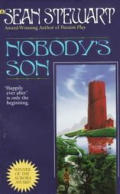
| Publisher: | Ace |
| Copyright: | 1993 |
| Printing: | May 1995 |
| ISBN: | 0-441-00128-9 |
| Format: | Mass market |
| Pages: | 273 |
This book suffers from a horrible synopsis in Powell's. I'm not sure if it's the publisher's fault, theirs, or someone else's, but the sum total of information available in the Powell's listing is:
The magical tale of the unhappy things that happen to a hero after "happily ever after" — a Canadian Library Association Best Young Adult Novel.
This is just bad, and I delayed reading the book in part because of some very erroneous impressions I got from it. Here is an excerpt from the book that speaks much better:
He saw Gail give her friend a quick, sharp glance. Well, maybe Lissa had meant to insult him. And yet, he didn't think the cut in the comment was really meant for him. Rather, it was as if he were hearing an echo of an old conversation between the two women. Must be a lot of water has flowed between these two. Deep water. Strong currents.
Reading the comment in Powell's, I had expected some sort of satire on the concept of "happily ever after," a nice enough idea, but something to read when in the mood for something poking fun at fantasy tropes. Whatever there is of that, it's faint and fleeting, and this book is not even remotely a satire. This book is indeed about what happens to the hero after he completes a quest and returns with the prize, but it's more about how he builds a relationship with the princess he ends up marrying, how he copes with the politics of the kingdom that he's thrust into, and how he finds meaning in his life after having finished the only thing that he had really thought about doing.
There is a lot of deep water and strong currents here, and many echos of old conversations. This is not a parody of fantasy; it's an embracing of it at a deeper level than the mere affairs of magic and power. It's about how fantasy touches a person, about a hero coming of age who truly does need to grow up despite his good heart, and about how saving the world comes more truly in understanding how to cut past what's expected than any great deeds, since what's expected is exactly what's failing when the world needs saving. It starts with disgust about the expectations for happily ever after and ends with a happily ever after that one can believe in.
I truly liked the hero here, a rough and uneducated person who does not magically become more educated or much less rough over the course of the story, who is not suddenly trained to read, and who was never simple and hence never needed to become more complicated, only wiser.
Advance warning: The first chapter requires some plodding, in part because you have to get used to the language of the characters, which is written in dialect, and in part because the first chapter just isn't much like the rest of the book. It's there as background and to lay the groundwork for important events later, but this book really begins in the second chapter. At that point, you meet the remaining cast of the story and start to get a feel for what the book is really like, and when it finally returns to the setting of the first chapter, the eeriness will fit better into the story.
A lot of water flows beneath these characters, in ways that left me thinking and happy to have listened to the rushing of it. Recommended.
Reviewed: 2004-05-30